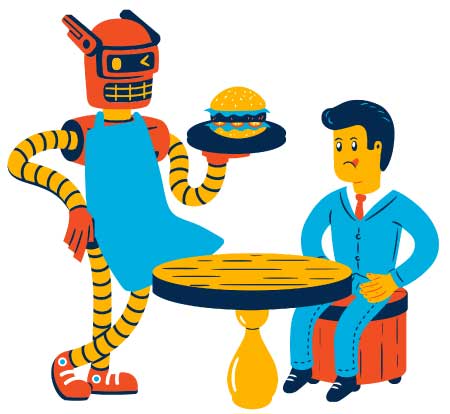Industry Trends, TES Insights
Technology and the Impact on the Future of Franchising

Technology, and the future of franchising.
Technological developments have influenced the world in countless ways, from telecommunications to computers and the Internet. These improvements have provided new franchised opportunities and efficiencies for the business world.
Technology has also affected the world around us, changing human behavior in various ways. Often, the implementation of new technologies raises ethical questions.
AI, and the future of franchising.
AI and machine learning are technologies quickly changing how we live, work and play. They have many applications, from cybersecurity, customer relationship management, and personal assistants.
Franchises are no different, and incorporating superior technology into their operations is one of the most efficient ways to boost business and attract high-quality franchisees. It’s also an essential aspect of a brand’s reputation in the age of instant-review sites and viral video clips.
Machine learning can help franchisors create standard operating procedures (SOPs) tailored to individual franchise locations and owners’ unique needs. It can also provide individual franchise owners with the tools to access system-wide data.
 In addition, AI and machine learning can be used to make loyalty programs more personalized to customers’ preferences and purchasing habits. It can also improve customer service, ensuring all franchisees have the tools to deliver exceptional guest experiences.
In addition, AI and machine learning can be used to make loyalty programs more personalized to customers’ preferences and purchasing habits. It can also improve customer service, ensuring all franchisees have the tools to deliver exceptional guest experiences.
A franchisee-oriented AI solution is the best way to ensure that your franchise systems are running smoothly and delivering an excellent customer experience. It can streamline back-office tasks, like scheduling opening dates and managing equipment and field service materials.
AI can also help franchises with a global reach, primarily when recruiting and retaining employees.
Robotics, and the future of franchising.
Robotic technology is a rapidly growing trend in the restaurant industry. From cooking to delivering meals, restaurants use automated technology to make processes faster and more efficient.
The robots can also help improve customer service by eliminating mistakes and supporting team members to stay calm during busy periods. In addition, it can save QSR operators money by freeing up staff to focus on other duties rather than wasting time with repetitive tasks.
Aside from improving quality and efficiency, AI-powered robots can also boost human-robot interaction and collaboration. For example, in the industrial sector, co-bots are used to test and assemble products.
As these technologies continue to evolve, they will only grow in importance. And that could have impacts on the job market.
One study has found that 20 million manufacturing jobs worldwide are at risk of being replaced by robots in the next five years. This means that many employees in the industry may need to take steps to retrain for jobs with more high-tech requirements.
The non-human McDonald’s!?!
A McDonald’s in Texas is testing the concept of a human-less restaurant. It features a self-service kiosk to order food and drinks and a special drive-through lane that delivers it to your car using a vertical conveyor belt. It’s a bold move, but McDonald’s says it’s the most efficient way to keep up with the rising demand for faster food.
 The company hasn’t released any specific numbers but plans to open several automated restaurants as part of Accelerating the Arches, its newest marketing campaign. This isn’t the first time McDonald’s has rolled out a robotic restaurant, but it’s the first to do it in Texas.
The company hasn’t released any specific numbers but plans to open several automated restaurants as part of Accelerating the Arches, its newest marketing campaign. This isn’t the first time McDonald’s has rolled out a robotic restaurant, but it’s the first to do it in Texas.
The test restaurant is located in the suburbs of Fort Worth, just outside the city center. It features a few technologically driven innovations that distinguish it from other chain restaurants. For instance, it boasts the most technologically advanced ordering system in the company’s history. The system uses artificial intelligence to handle most of the ordering process, saving the restaurant staff from dealing with the unique stuff. It’s also got the shortest queue for ordering and picking up your order, which is a big deal if you’re on the go and not in the mood to wait in a crowded restaurant.
Cyber Security, and the future of franchising.
The cybersecurity industry is booming and offers opportunities for those with the right skills. It also has many entry-level jobs that don’t require a specific degree.
 Cybersecurity is essential to any company, and keeping your system and data secure from hackers is critical. In addition, you can help reduce the chances of a security breach by raising awareness of potential threats and providing security training to employees.
Cybersecurity is essential to any company, and keeping your system and data secure from hackers is critical. In addition, you can help reduce the chances of a security breach by raising awareness of potential threats and providing security training to employees.
Often, franchisees and franchisors are vulnerable to cybersecurity issues because they operate as a connected network of businesses that collect and transmit diverse consumer data. This type of information is easy to access and is a big target for cybercriminals.
A key aspect of maintaining a solid cybersecurity strategy is to educate franchisees and employees on the importance of cybersecurity best practices. This can include educating them on what types of information are confidential and how to handle sensitive data.
Human error is the number one cause of data breaches, and it’s important to minimize it as much as possible. Educating everyone in the franchise network on digital security best practices can ensure they are doing everything correctly, which could result in a costly breach.
In addition, it’s essential to keep your business safe from any possible hacking attempts by installing and implementing the latest cybersecurity software. These products can protect your network from ransomware, viruses, and other threats. They can also block malicious websites from displaying on your web so that your customers and employees aren’t exposed to them.
Minimum wage, and the future of franchising.
Many franchisees, especially those operating quick-service restaurants, have been concerned about how minimum wage increases affect their cash flow. These increases will likely directly impact their ability to reinvest in their restaurants and may also affect the number of jobs at their locations.
The franchising industry has been particularly invested in the nationwide minimum wage debate because of its unique business model. Traditionally, franchisees have been defined as independent local business owners who operate independently from their franchisors.
However, recent developments have made it easier for local franchisees to become part of a larger company’s payroll system.
The franchise industry is also working to educate the public on its unique business model and continue to work with government officials to create a healthy environment for franchises in the future.
Workforce evolution.
The world of work is increasingly undergoing a rapid shift, and the way people and organizations do their jobs will need to change too. The changes can be driven by new technology, which will transform existing industries and the types of jobs in them.
For workers, this change could mean moving into a different occupation or learning a new skill. As the pace of automation and technological advancement accelerates, an increasingly large number of workers may need to switch their professions. This could be a shift on a scale that has yet to be seen since the transition of the global workforce from agriculture to industrial work in the early 1900s.
Organizations that embrace an approach that enables employees to self-select their interests and abilities will be better able to meet the challenges of a rapidly evolving environment. These approaches can be more flexible, responsive, and dynamic than top-down ones, which rely on static definitions of business needs and the skills to meet them.
To be effective, these methods must be accompanied by workplace and cultural change that allows people to build trust, autonomy, flexibility, respect, communication, and purpose. This will help them feel a sense of belonging to a community and allow them to work effectively with others.
In 2023, businesses that prioritize innovation and consumer growth will stand out. The franchising sector will face a number of innovations. The trend is upward. In unpredictable economic times, it’s critical to evaluate your existing circumstance carefully. It is time for you to look at a franchise solution to changes in your workplace.